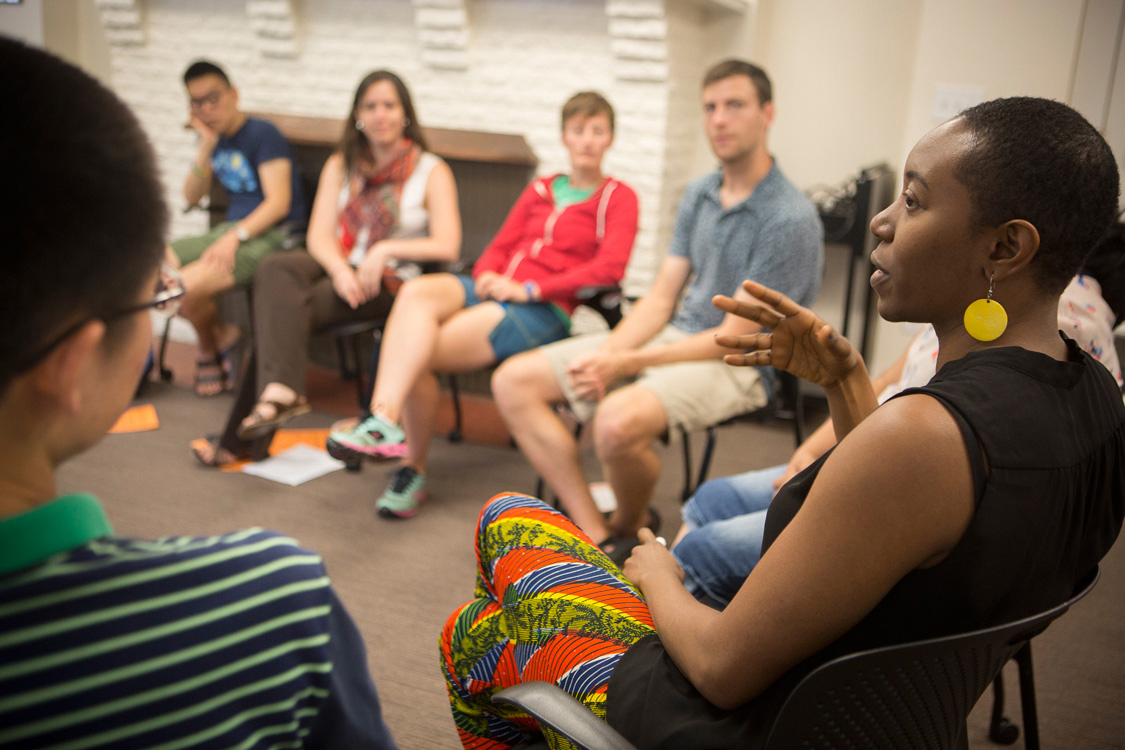Program enhances grad student, postdoc dialogue skills
By Daniel Aloi

A group of emerging scholars at Cornell learned new skills for effective dialogue, relationship-building and managing conflict in academic environments in a new program this summer, facilitated by the Intergroup Dialogue Project (IDP).
Tailored for graduate students and postdoctoral scholars, the program is peer-led and collegial. Meeting for six three-hour sessions at 6-2-6, the Center for Intercultural Dialogue, participants learned from one another by sharing issues and perspectives related to their social identities, and how these might influence them as students and future scholars.
“Graduate students are required to communicate and work across cultural, social and power differences on a daily basis,” said IDP Director Adi Grabiner-Keinan, M.A. ‘11, Ph.D. ’16. “They need to navigate different spaces, ways of thought and academic practices. They are also occupied with questions and thoughts about the scholars and professionals they want to become.”
A goal of the program is to “create academic spaces that allow individuals and groups to work together as equals, and to challenge oppression and discrimination,” she said. “The idea of diversity here is you bring your unique personality to the table. Many people feel they have to hide, or can’t expose, their full identity.”
IDP seeks to positively transform campus climate and create inclusive social change through experiential learning courses, focused on getting past societal and institutional norms and perceptions of identity to foster intercultural experiences.
Participants in the summer program, adapted from IDP’s undergraduate classes, began by discussing “all aspects of their identities – disability, sexual orientation, gender, race, but also a new one – their identity as scholars, and what that means in relation to diversity and social justice issues,” she said.
“Their questions are related to mentorship, their teaching, their relationships with their colleagues,” she said. “We look at the big picture but also their personal experiences. We encouraged them to think about their personal life, and not to theorize things immediately.”
Graduate student and IDP co-facilitator Christine Barker said: “An interesting dimension emerged. We had humanities students who are used to talking about theory and problematizing, alongside STEM students who were more solutions-oriented.”
“That’s a critical component of their identities,” said Sara Xayarath Hernández, Graduate School associate dean for inclusion and student engagement. “Not only as scholars, but their identities in their fields and how they process and engage with ideas.”
“I think both groups really learned so much from each other,” Grabiner-Keinan said.
Offering intergroup dialogue, alongside professional development and teaching assistant training, “is an investment at Cornell in preparing future faculty,” Hernández said. “We had identified the need, and we had graduate students affirming the need and asking for this.”
In discussions among the Graduate School, IDP and the Center for the Integration of Research, Teaching and Learning, “we worked together to create a meaningful process for graduate students and postdoctoral scholars to explore their identities, to practice communication across difference, and to think together about authentic diversity in academia,” Grabiner-Keinan said.
This pilot program is expected to reach about 30 people over two separate sessions in its first year, Hernández said. The original IDP program for undergraduates started with 30 students in the fall of 2012 and now has more than 200 students each semester.
Media Contact
Get Cornell news delivered right to your inbox.
Subscribe